|
|
|
Sort Order |
|
|
|
Items / Page
|
|
|
|
|
|
|
| Srl | Item |
| 1 |
ID:
164321
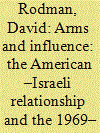

|
|
|
|
|
| Summary/Abstract |
The dominant view of the American‒Israeli relationship holds that it has been driven primarily by shared interests and values; however, since the 1960s, the relationship has been governed first and foremost by a ‘security-for-autonomy’ bargain. Under the terms of this bargain, Washington has obtained a significant amount of influence over Israeli foreign policy in exchange for American arms transfers to Israel. The 1969‒1970 War of Attrition clearly illustrates how this bargain has operated in practice. The United States manipulated Israeli military conduct in a manner that accommodated American national interests by withholding or supplying arms at key junctures of the war.
|
|
|
|
|
|
|
|
|
|
|
|
|
|
|
|
| 2 |
ID:
164329
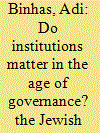

|
|
|
|
|
| Summary/Abstract |
The era of new governance in the last decades reflects the expanded space granted to the two non-state sectors – business and non-profit – in policy-making and implementation. By way of exploring whether and to what extent the institutional approach is still an effective method of analysing public policy, this article investigates the Jewish Agency for Israel as a case study, testing existing definitions for non-governmental organisations (NGOs and QUANGOs). The difficulty in finding the most appropriate definition serves as testimony to the feebleness of the institutional approach and the existing definitions for non-state players, and raises the need for new theoretical interpretations.
|
|
|
|
|
|
|
|
|
|
|
|
|
|
|
|
| 3 |
ID:
164322
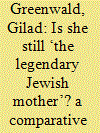

|
|
|
|
|
| Summary/Abstract |
In an attempt to demonstrate how historical changes in public opinion concerning women in politics might be reflected in the media, this article offers an examination of Golda Meir’s 1969 election campaign coverage in the Israeli press compared to Tzipi Livni’s in 2009. Through a gender-focused content analysis of 878 news items, we show how, despite the scholarly argument regarding a ‘gender-blind’ socio-historical attitude towards Meir, the Israeli media discourse did in fact strongly emphasise gender-oriented elements while covering her 1969 candidacy. However, the historical comparison also shows that, with the passage of time, the Israeli press was significantly affected by political personalisation trends, as well as by a growing influence of more conservative voices, and as a result became far more gender-centred and stereotypical in Livni’s case.
|
|
|
|
|
|
|
|
|
|
|
|
|
|
|
|
| 4 |
ID:
164327


|
|
|
|
|
| Summary/Abstract |
This article discusses the shift in Israel’s policy towards its Arab minority in 1990–2010 – from a security-based to a civil approach. This shift was reflected not only in increased resource allocation but also in the initiation of a dialogue with Arab politicians and public figures. Among the most prominent results of this policy change have been a reduction in socioeconomic gaps between Israel’s Jewish and Arab communities, a growing number of Arabs enlisting in national service, greater integration of Arabs in the civil service, and the approval of master plans for the development of all Arab settlements.
|
|
|
|
|
|
|
|
|
|
|
|
|
|
|
|
| 5 |
ID:
164328
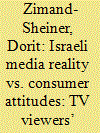

|
|
|
|
|
| Summary/Abstract |
Covert advertising such as embedded paid content (EPC) is flourishing on Israeli TV, but in most cases regulators’ prohibiting rules are not enforced. Though the regulators’ role is to safeguard the public’s right to know, the public’s attitudes and ethical perceptions of EPC on TV is not being addressed. The current survey is an initial attempt to discover TV viewers’ attitudes towards EPC. While respondents’ attitudes towards product placement were indifferent, their attitudes towards EPC were generally negative. Results indicate that after being informed regarding paid TV content, respondents considered EPC to be culturally acceptable in Israeli (relativism), but morally unethical (moral equity). They also considered EPC a violation of the unwritten contract with media creators regarding the authenticity of media content (contractualism). Findings suggest that the Israeli public should be better informed regarding EPC and should be taken into consideration when dealing with its use, regulation and enforcement.
|
|
|
|
|
|
|
|
|
|
|
|
|
|
|
|
| 6 |
ID:
164323
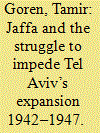

|
|
|
|
|
| Summary/Abstract |
Tel Aviv, which the Jaffa Arabs saw as the realisation of the Zionist enterprise, begot hostility to itself. Insofar as the city developed, it was perceived as a threat to Jaffa. The authorities’ approval of the enlargement of Tel Aviv’s boundaries in the early 1940s was, for the Arab side, a challenge to Jaffa’s future, and spawned the declaration of a struggle to achieve two goals: obstruction of Tel Aviv’s expansion and enlargement of Jaffa’s domain. The article examines the measures taken by the Arab side against Tel Aviv’s expansion, their gains and their implications for Jaffa.
|
|
|
|
|
|
|
|
|
|
|
|
|
|
|
|
| 7 |
ID:
164319
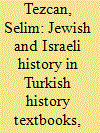

|
|
|
|
|
| Summary/Abstract |
This article examines the treatment of Jewish and Israeli history in post-World War II Turkish textbooks. Jewish and Israeli history remains largely relegated to the margins in the books. The Jews of Arabia are shown in an antagonistic role during the advent of Islam, while the Jews of the Ottoman Empire are generally subsumed under the category of non-Muslims. The Ottoman reception of the Spanish (Sephardi) Jews is used to exemplify Turkish tolerance. The subject of the Jewish Holocaust is usually avoided. The older textbooks strike a more balanced approach towards Israel than the recent ones.
|
|
|
|
|
|
|
|
|
|
|
|
|
|
|
|
| 8 |
ID:
164325
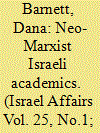

|
|
|
|
|
| Summary/Abstract |
This article reviews the writings of post-Zionist, neo-Marxist Israeli academics, and the way they have contributed to blurring the line between legitimate criticism of Israeli policies and actions and classical and/or new forms of anti-Semitism. By way of doing so, it will describe the paradigmatic shift in the social sciences and humanities that has given rise to the phenomenon of academic anti-Semitism; analyse the writings of neo-Marxist Israeli scholars with an emphasis on anti-Semitic themes in their writings; and look at the extra-mural criticisms made by Israeli academics and the unwillingness of many universities to confront them.
|
|
|
|
|
|
|
|
|
|
|
|
|
|
|
|
| 9 |
ID:
164326


|
|
|
|
|
| Summary/Abstract |
Dorit Feldman is a prolific Israeli artist who over the course of several decades has focused on images of wide landscapes that integrate geological, cartographical, and archeological layers.Amongst these stratified landscapes are scattered pagan images such as Classical architecture, the remains of ancient synagogues, the image known as the “Mona Lisa” from Sepphoris, and a thick book that arouses connotations to the Bible or to history in general. The basic assumption underlying this study is that the analysis of a contemporary work of art that combines ancient images and motifs requires an initial analysis of their original significances. This in turn leads to a discussion of their metaphorical meanings in relation to the modern-day experience. In the case of Feldman's works, the issues that arise are those of the relationship between religion, land, and a place; idolatry in Antiquity and its current manifestations; the significances of pagan images in a Jewish context in Antiquity in relation to contemporary Epicureanism; secular Judaism and religion; and the multilayered pluralism of Israeli culture. This study is anchored in the wider field of Classical reception studies, and thus incorporates ancient sources and research material on Antiquity as well as the contemporary experience.
|
|
|
|
|
|
|
|
|
|
|
|
|
|
|
|
| 10 |
ID:
164324
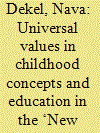

|
|
|
|
|
| Summary/Abstract |
The tension between universal and local values is reflected in educational discourse in every period and society. The education of children serves to strengthen national identity and local culture in the face of globalising trends. This article examines the position and influence of western childhood images and pedagogical concepts, developed mainly from the eighteenth century onward, on the concepts and attitudes of educators of the Jewish national revival in the Land of Israel at the beginning of the twentieth century. Its focus is on the period in which the Hebrew educational system was founded, and children were valued as the future generation that would materialise the adults’ national hopes.
|
|
|
|
|
|
|
|
|
|
|
|
|
|
|
|
|
|
|
|
|